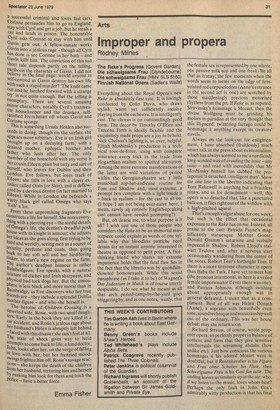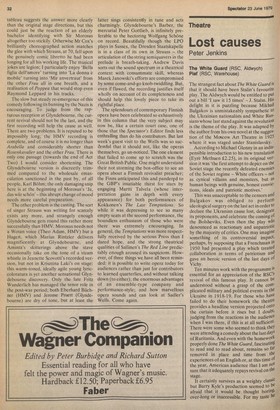Improper and propera
Rodney Milnes
The Rake's Progress (Covent Garden) Die schweigsame Frau (Glyndebourne) Die schweigsame Frau (HMV SLS 5160) Finnish National Opera (Sadler's Wells) Everything about the Royal Opera's new Rake is absolutely first-rate. It is lovingly conducted by Colin Davis, who draws stylish, warm yet sufficiently incisive playing from the orchestra. It is intelligently cast. The chorus is on outstandingly good form. The decor by Timothy O'Brien and Tazeena Firth is ideally flexible and the exquisitely made props are a joy to behold. Nick Chelton's lighting is, as ever, helpful. Elijah Moshinsky's production is a technical tour-de-force, using with complete assurance every trick in the trade from Hogarthian realism to spirited alienation. Among the more extreme manifestations of the latter are wild variations of period within the Georgian-theatre set, a little music-hall top-hat-and-cane routine for Tom and Shadow and, most extreme, a prompt box complete with a light inside it — back to realism — for the cast to sit on. (1 hope I am not being over-naive here; I mean, surely ar? entirely English-speaking cast cannot have needed prompting?) But, oh dearie me, to what purpose is it all? I wish just one of those people who considers the Rake to be an immortal masterpiece could explain in words of one syllable why this bloodless pastiche need detain for an instant anyone interested in theatre as opposed to petit point. A freethinking friend who shares my extreme impatience holds that the fatal flaw lies in the fact that the libretto was by quondamcloseted homosexuals. While this sexist paraphrase (as I take it to be) of Wagner's Das Judentum in Musik is of course utterly despicable, I do see what he means as all that arch period-camp-by-the-yard goes sniggering by, and as one notes, wanly, that the female sex is represented by one whore, one passive milk-sop and one freak. Be all that as it may, the few moments when the words seem to teeter on the edge of firmwristed red corpuscledom (Anne's entrance in the second act is one) are scotched by those maddeningly precious motorised rhythms from the pit. If Rake is, as reputed, Stravinsky's hommage a Mozart, then the divine Wolfgang must be grinding his molars in paradise at the very thought that this ill-paced, twittering farrago could be hommage a anything except its creators' navels.
Always an the look-out for enlightenment, I have absorbed (fruitlessly) much smart talk in the press about existentialism, which has always seemed to me a needlessly long-winded way of avoiding the issue — any issue — and read with incredulity that Mr Moshinsky himself has dubbed the protagonist 'a detached, intelligent man'. Show me one line in the libretto indicating that Tom Rakewell is anything but a brainless ninny, and as for detachment — well, this opera is so detached that, like a punctured balloon, it flies right out of the window with a high-pitched squeal.
That's enough vulgar abuse for one week, but such is the effect that occasional exposure to the Rake has on me. Instead, all praise to the cast: Patricia Payne's magnificently statuesque Mother Goose, Donald Gramm's saturnine and verbally impeccaL le Shadow, Robert Lloyd's stalwart Trulove and, after a nervous start occasionally wandering from the centre of the notes, Robert Tear's forthright Tom. If there is a more tiresome character in opera than Baba the Turk, I have yet to meet him (the pronoun intentional, as here is a veiled female impersonator if ever there was one), and Patricia Johnson, although swishing about appropriately enough was in general defeated. I mean that as a compliment. Best of all was Helen Donath (Anne), a soprano with beautifully even tone, sound technique and musicianship well out of the ordinary. This was her house debut: may she return soon.
Richard Strauss, of course, wrote properer opera, so perfectly proper in balance of content and form that they give sensitive intellectuals the screaming abdabs (how unlike etc). Just how conscious the various hommages a his adored Mozart were is doubtful, but if Rosenkavalier is his Figaro and Frau ohne Schatten his Flute, then Schweigsame Frau is his Cosi fan tutte. The ending leaves us similarly up in the air: who, if we listen to the music, loves whom best? Perhaps the only fault in John Cox's admirably witty production is that his final tableau suggests the answer more clearly than the original stage directions, but this could just be the reaction of an elderly bachelor identifying with Sir Morosus altogether too stickily. Otherwise Mr Cox's brilliantly choreographed action matches the glee with which Strauss, at 70, fell upon the genuinely comic libretto he had been longing for all his working life. The musical jokes are legion; I particularly enjoy 'Bella figlia dell'amore' turning into 'La donna e mobile' turning into 'Mir anvertraut' from the other Frau all in one breath, and a realisation of Poppea that would stop even Raymond Leppard in his tracks.
The slow but steady re-emergence of this comedy following its banning by the Nazis is encouraging. To judge from the rapturous reception at Glyndebourne, the current revival should not be the last, and the first recording will help the cause as well. There are two problems. It is reputed to be impossibly long; the HMV recording is complete, and of course it is no longer than Arabella and considerably shorter than Rosenkavalier and the other Frau. There is only one passage (towards the end of Act Two) I would consider shortening. The Glyndebourne version is discreetly trimmed compared to the wholesale emasculation sanctioned in the past by, of all people, Karl Bohm; the only damaging snip here is at the beginning of Morosus's `Ja, das war schon' — this abrupt change of mood needs more careful preparation.
The other problem is the casting. The sort of singer Strauss was writing for scarcely exists any more, and strangely enough Glyndebourne gets round this rather more successfully than HMV. Morosus needs not a Wotan voice (Theo Adam, HMV) but a Hagen, which Marius Rintzler delivers magnificently at Glyndebourne, and Aminta's skitterings above the stave occasionally take on the tone of a steam whistle in Jeanette Scovotti's recorded version, but not in Krisztina Laki's on stage: this warm-toned, ideally agile young lyriccoloratura is yet another sensational Glyndebourne discovery. Only the late Fritz Wunderlich has managed the tenor role in the post-war period; both Eberhard Buchner (HMV) and Jerome Pruett (Glyndebourne) are dry of tone, but at least the latter sings consistently in tune and acts charmingly. Glyndebourne's Barber, the mercurial Peter Gottlieb, is infinitely preferable to the hectoring Wolfgang Schone on record. Beautifully though the LPO plays in Sussex, the Dresden Staatskapelle is in a class of its own in Strauss — the articulation of the string semiquavers in the prelude is breath-taking. Andrew Davis sorts out the sound spectrum in a theatrical context with consummate skill, whereas Mare k Janowski's efforts are compromised by some come-and-go knob-twiddling. But, even if flawed, the recording justifies itself wholly on account of its completeness and should help this lovely piece to take its rightful place.
The splendours of contemporary Finnish opera have been celebrated so exhaustively in this column that the very subject may now be, like a certain court case, one of those that the Spectator's Editor finds less enthralling than do his contributors. But last week's guest visit to the Wells was so successful that it should not, like the operas themselves, go un-noticed. The one element that failed to come up to scratch was the Great British Public. One might understand their not storming the box-office to see an opera about a Finnish revivalist preacher; the Finns anticipated this and pandered to the GBP's insatiable thirst for stars by engaging Martti Talvela (whose interpretation gains in depth with every appearance) for both performances of Kokkonen's The Last Temptations. So while it was depressing to see so many empty seats at the second performance, the boundless enthusiasm of those who were there was extremely encouraging. In general, the Temptations was more respectfully received by the serious Press than I dared hope, and the strong theatrical qualities of Sallinen's The Red Line predictably enough aroused its suspicions. However, of three things we have all been reminded: it is possible to write opera today for audiences rather than just for contributors to learned quarterlies, and without talking down (to either); the enormous advantages of an ensemble-type company and performance-style; and how marvellous opera sounds and can look at Sadler's Wells. Come again.











































 Previous page
Previous page